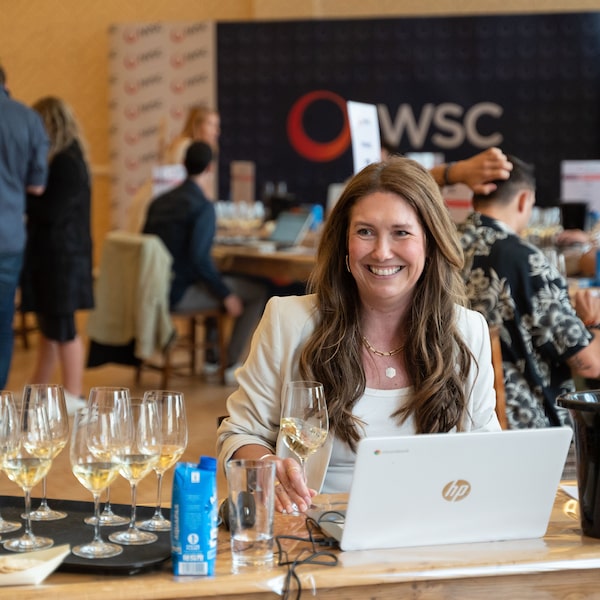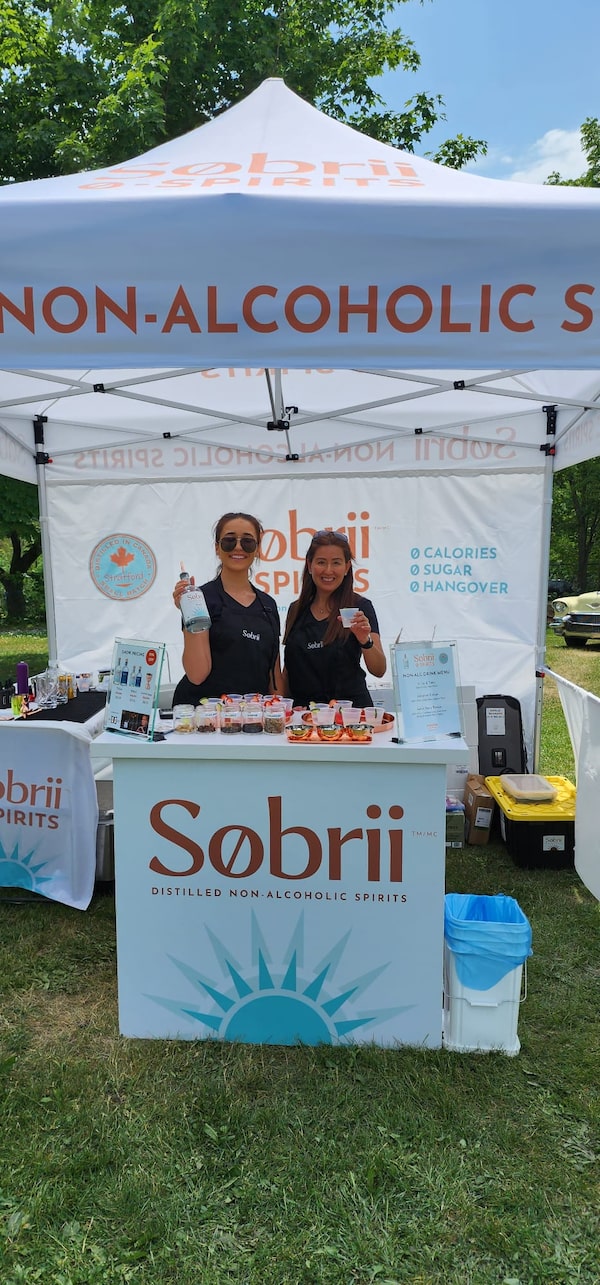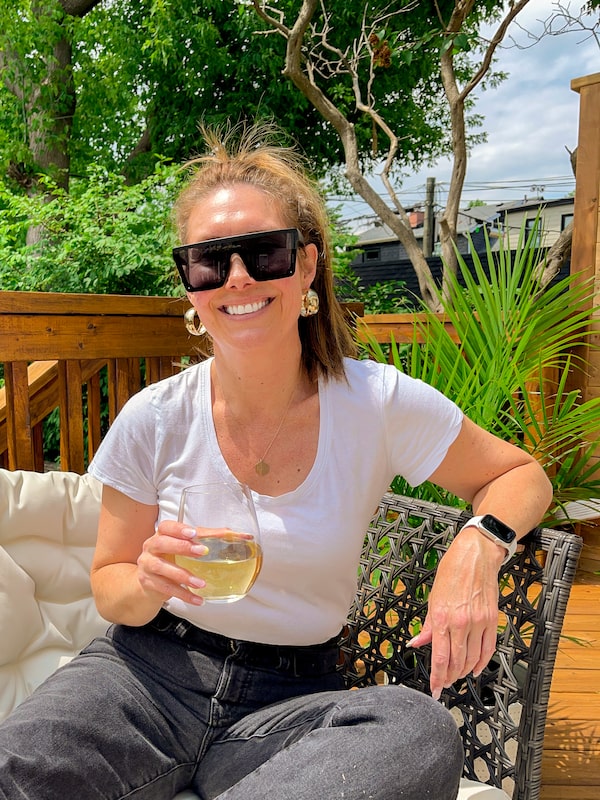
Sarah Kate is publisher of Some Good Clean Fun, an online magazine that supports the sober curious or alcohol-free lifestyles.Seb Higgins/Supplied
When the village of Elora, Ont., held its first Craft Gin Festival last month in celebration of World Gin Day, one of the nine small-batch local distillers invited to showcase their wares was Sobrii.
Bob Huitema, who launched Sobrii in 2019, was thrilled to be invited to the festival given that his gin is alcohol-free. Named after the Latin word for sober, the craft distiller from nearby Stratford sells non-alcoholic and sugar-free gin and tequila.
“We weren’t quite sure what to expect because most people who come to this type of event come to drink,” says Huitema. “We are still a novelty so there is some education involved.”
Huitema started the company because he’d reached a point in his own life where he wanted to drink less but could not find a decent cocktail without booze. He was pleasantly surprised to find that his festival booth was just as busy as the others.

Sobrii at the Craft Gin Festival in Elora, Ont., on June 10.Supplied
“I made them a cocktail, in the same glass and with the same garnish as the other vendors, and they consistently told me they could not tell the difference,” he said. “They also thanked me for creating it, which is something I hear all the time from people who tell me it’s perfect for what they need right now: an alternative that tastes good so they can cut back on their drinking. Not because they’re being forced by worries of addiction but simply because they want to make healthier choices and feel better.”
Even 10 years ago, Huitema doubts that a zero-proof libation like his would have found much acceptance. However, the feedback he heard in Elora reflects a shift happening around the world toward more mindful drinking, a trend reflected in the growing number of “sober curious” people who are rethinking their relationship with alcohol.
Being sober curious – a term coined by British author Ruby Warrington who wrote a 2018 bestseller of the same name – means different things to different people. To Huitema it means carefully considering every impulse or expectation to drink, versus mindlessly going along with the dominant drinking culture.
“I never intended to stop drinking but that’s pretty much what has happened. It all comes down to how much better I feel,” he says. “I sleep better. It helps with my weight management and ability to handle stress. And I can avoid all the complications alcohol can bring up, from the mild to the extreme.”
To Celina Rodiguez, a 25-year-old naturopathic medicine student in Toronto, the term sober curious means making the choice to have more experiences in life that are not influenced by booze. When she does order a cocktail, she says it’s a “treat” rather than an expectation. “Because of social media, my generation is way more attuned to the health risks associated with drinking than generations before.”
In January, when the Canadian Centre on Substance Use and Addiction issued its revised recommendation that Canadians consume no more than two drinks per week (a drastic reduction from the previous recommendation of two drinks per day), Rodiguez says it was the wake up call she needed to overhaul her perception of what safe drinking looks like.
“Alcohol is so deeply entrenched in our culture it can be difficult to accept the messaging that drinking isn’t good for you,” she says. “I still drink, but I drink less casually. I no longer drink if I’m bored. And I don’t drink for courage or as a reward. Is it easy? No. The social pressures to drink are still there. But I now often have a friend who will join me in abstaining when we’re out, and that makes it easier.”
Recent studies suggest that Rodiguez’s age group are the ones leading the sober curious charge: In 2022, the online alcohol marketplace Drizly reported that 38 per cent of Gen Z-ers and 25 per cent of millennials said they drank more non-alcoholic products in 2022 than in 2021.
This demographic is also drinking less than generations before. A 2020 report from Berenberg Research found Gen Z drink 20 per cent less than millennials; and millennials are drinking less than both Gen X and Baby Boomers. On Tinder, over 70 per cent of members (of which Gen Z is 50 per cent of its total membership) identify as non-alcoholic.
Equally interesting is the fact that many young people see sobriety as something to be proud of – a badge of honour that reflects their commitment to a healthier lifestyle. Whereas older generations still view not drinking as a sign of weakness, the implication being they must have had a “problem” or battled addiction.
Sarah Kate, 46, stopped drinking in April, 2020, because her occasional glass of wine in the evening was turning into three or four. “I had kids. I was a working executive and I found myself reaffirming the narrative that moms need wine to get through this ‘horrible’ thing called motherhood,” she says. “Little by little, I was really leaning on the stuff and I hated the feeling of having to rely on it as an everyday part of life.”
Abstinence has dramatically changed her life. Kate is now publisher of Some Good Clean Fun, an online magazine that supports the sober curious or alcohol-free lifestyles. Sobriety is becoming more readily accepted but she says there is still a stigma attached to it: “Our culture revolves around alcohol – that has not changed. However, the sober curious movement recognizes you don’t have to hit ‘rock bottom’ to make a serious lifestyle change. It has started the conversation about our relationship with alcohol and how we use it – and abuse it.”

More than 80 per cent of the traffic to Kate's Some Good Clean Fun comes from women.Supplied
Over 80 per cent of the traffic to her website is women whom, Kate says, are far more open to having those tough discussions around alcohol than men. “The doors have opened on the relationship between alcohol and wellness. Women, especially, are questioning what role the substance is playing in their lives. Is it necessary? Does it make them feel good? More often than not, the answer is no.”
David Soberman, a professor of marketing at University of Toronto’s Rotman School of Management, says a global, cultural shift toward wellness has certainly played a part in people choosing to join the sober curious movement. However, he believes societal norms around drinking and driving, and the legalization of cannabis have also played a role in the decline of alcohol consumption.
Younger generations have had messaging about the importance of responsible drinking their entire lives, something that may be reflected in the drinking and driving statistics. In 2009, Soberman says there were 2.4 drunk driving charges per 1,000 people. In 2020, that figure fell to 1.5 charges per 1,000 people, representing a 37.5 per cent drop on a per capita basis.
Meanwhile, cannabis use has grown significantly, with drug-related impaired driving charges increasing fourfold from 2009 to 2020. “Clearly, for many people, cannabis has replaced alcohol, which has likely contributed to the decline in drinking,” Soberman says.
Parents and sober culture are redefining club life
Whatever the root cause of the rise in the sober curious movement, Vancouver’s Fiona Hepher believes stricter drinking guidelines, combined with the wealth of information on social media about the health hazards of overconsumption, is finally making alcohol less “cool.”
“Our culture has had this over-romanticized perception of alcohol for years, but thankfully that is changing,” says Hepher, co-founder and creative director of Sansorium, a Vancouver-based business that sells non-alcoholic spirits to customers looking for the taste of booze without the buzz. “More and more people – from Gen Z’s right through to boomers – are finally acknowledging their own exhaustion around alcohol and leaning into alcohol-free substitutions.”
She is one of them. Hepher, 32, joined her mom Kathryn in cutting alcohol out of her life around the start of the pandemic and has never looked back. “I’m just happier,” says Hepher. “I never really tolerated alcohol well. My hangovers were brutal. I didn’t like the lack of control and I felt like I was on a low frequency.”
Cutting booze from her life has been liberating. “When you stop drinking you realize what situations you feel comfortable in, and what situations you force yourself into,” she says. “Emotional sobriety, for me, means coming back to the centre of who I am. It’s brought me groundedness and it’s brought me peace of mind.”